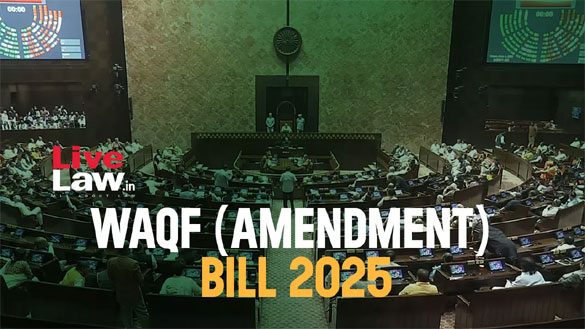By Sushil Kutty
Who won and who lost? The anti-waqf amendments lobby claims the government was forced to eat crow and give an undertaking to protect the status of notified and registered Waqf properties, including the all-important waqf-by-user properties. The government also had to promise not to appoint any non-Muslim to the Waqf Council or waqf boards till the final verdict.
The pro-amendments lobby said the government won the day as there’s no stay on the Act and the fight continues against properties that haven’t been notified and registered. So, it’s a Mexican Standoff, neither side a clear victor. AIMIM Chief Asadsuddin Owaisi, the first petitioner to knock on the doors of the apex court, conceded as much. “Wait” was his cryptic advice.
But Saharanpur Congress MP Imran Masood and fellow Congressman and Rajya Sabha MP Imran Pratapgarhi along with the Aam Aadmi Party’s Okhla MLA, Amanatullah Khan, who was chairman of a state waqf board, sported wide grins. The pro-amendments advocate, Vishnu Jain, sought solace in “we will put forward our view.”
The government asked for and got 7 days’ time to come up with answers to the Supreme Court’s observations on waqf for user and Hindu representation on waqf boards. The top court has only put a “pause” on certain portions of the Act. The government will file a detailed response and the top court hasn’t said anything on the constitutional validity or invalidity of the Act.
The top court gave the impression Wednesday that it intended to correct flaws in the Act with an interim order. But Solicitor-General Tushar Mehta managed to stall the court for a day. On Thursday, Mehta pressed home the advantage and got a week’s time, which pro-government advocates said was the outcome of the “central government’s raw power.”
The anti-waqf amendments lobby called it “Mehta’s fervent appeal” and buying time which will not make a difference to the final outcome. Supporters of the government are of the view the 3-judge bench had come with its mind made and “system toh unka hai na?”
There is widespread belief CJI Sanjeev Khanna, a “broadminded secular justice”, will rule in favour of the “Muslims.” Also, the Supreme Court was always with and for the Waqf Act, how else could the top court not see the “injustices and inequalities” ingrained in the 1995 Act? Besides, CJI Khanna will retire in May and he will deliver from the heart!
Hence, it doesn’t matter what arguments the Centre trots out, the Act as it is now will not pass the Supreme Court test, not when “waqf by user” is sacrosanct to the court as well. Doing away with waqf by user is a 100% surety. The top court’s concerns were three, “namely the status of waqf-by-user declared earlier by courts, appointment of non-Muslims in the Central Waqf Council and state waqf boards, and not allowing a property to operate as waqf if it is disputed as belonging to the government.”
At one point, the Centre’s desperation stood out like a sore thumb. “These questions are pertinent but this is not a case where the court will consider (the) stay of the law as it must be considered in the light of voluminous material. We as government and Parliament are answerable to the people and there were scores of letters received from people who said their private lands and villages are being taken over as waqf,” Solicitor-General Mehta pointed out.
BJP supporters called Mehta’s words the “raw power of the central government.” Other groups quantified the situation as repairable depending on what transpires behind closed doors in the 7-day interregnum; in other words, there’s always scope for “a slip between the cup and the lip!”
To some, the 7-days’ time given to the Centre is taking a risk. CJI Sanjeev Khanna posted the matter for May 5: “Till the next date of hearing the Solicitor-General assures that no appointments would be made to the Central Waqf Council and the Waqf Boards in the states and NCT of Delhi under sections 9 and 14 of the 2025 Act…if the Government of any State or the National Capital Territory of Delhi makes any such appointment(s), the same may be declared void.”
The Supreme Court appeared to play both sides. “There may be infirmities in the earlier law. We had also said that the present law has many positive things, but at the same time, we do not want the situation to change so drastically that it affects the petitioners,” the 3-judge bench opined. Solicitor-General Mehta returned with “any direction to stall the Act will be very harsh. This (Act) affects a large number of people whose right to land and property is to be decided. Even for considering the fallout of the court’s order, this matter needs to be first heard.”
The common man in the street doesn’t understand what takes primacy, the welfare of millions of people waiting to be lifted out of poverty or getting a chance to living a better life with waqf welfare schemes or the “thumb rules” that have to be followed even if they’re entrenched to serve the interests of the entrenched few!
What about the entire “village” of non-Muslims in Vellore district of Tamil Nadu declared as “Waqf property” only last week? What about the Catholic fisher-folk left in the lurch in Munambam, a “locality in Kochi”, which, too, has been claimed by the Waqf? Problem is there were too many anti-poor thumb rules in the 1995 Waqf Act and the Supreme Court appears lost in thumb rules, including the one which says “the situation prevailing today should continue so that the rights of persons are not affected.”
The Congress hailed the Supreme Court, saying “the earlier legal position has been re-established and is an important step in restoring order.” Assam, Rajasthan, Haryana, Chhattisgarh, Madhya Pradesh and Maharashtra intervened in the case to support the Act. But they were up against the might of a Supreme Court which is in no mood to buck the thumb rules. CJI Sanjeev Khanna refused to take the bait when SG Tushar Mehta asked, “Aren’t you a Hindu justice hearing this case?” to the question, “Will you allow Muslim participation in Hindu temple trusts?” (IPA Service)




 In Electronics And Auto Components, Trump’s Tariff War Has Opened Up Fresh Opportunities To India
In Electronics And Auto Components, Trump’s Tariff War Has Opened Up Fresh Opportunities To India 